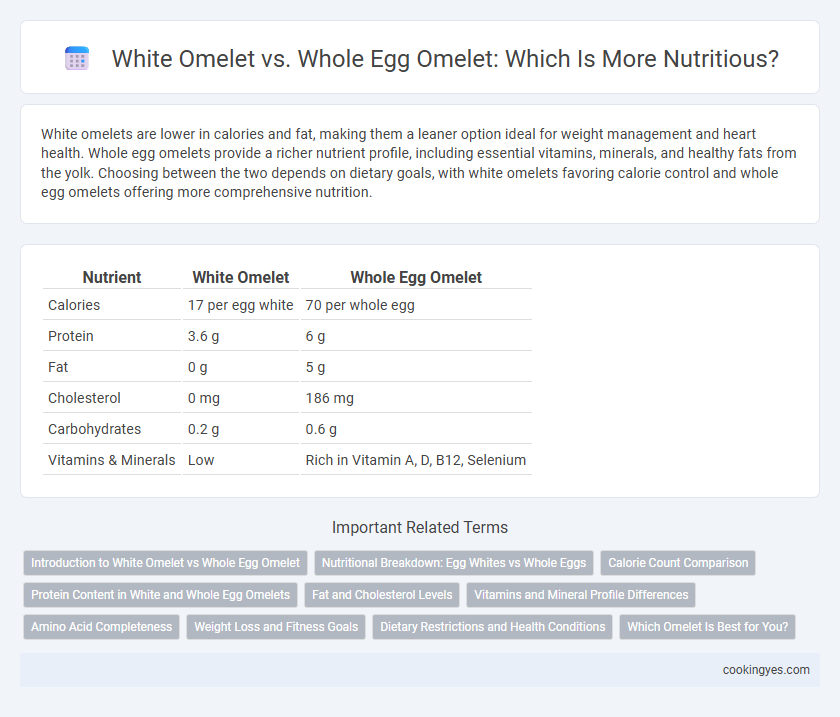White omelets are lower in calories and fat, making them a leaner option ideal for weight management and heart health. Whole egg omelets provide a richer nutrient profile, including essential vitamins, minerals, and healthy fats from the yolk. Choosing between the two depends on dietary goals, with white omelets favoring calorie control and whole egg omelets offering more comprehensive nutrition.
Table of Comparison
| Nutrient | White Omelet | Whole Egg Omelet |
|---|---|---|
| Calories | 17 per egg white | 70 per whole egg |
| Protein | 3.6 g | 6 g |
| Fat | 0 g | 5 g |
| Cholesterol | 0 mg | 186 mg |
| Carbohydrates | 0.2 g | 0.6 g |
| Vitamins & Minerals | Low | Rich in Vitamin A, D, B12, Selenium |
Introduction to White Omelet vs Whole Egg Omelet
White omelets contain primarily egg whites, offering high-quality protein with lower calories and minimal fat, making them ideal for fitness-focused diets. Whole egg omelets include both yolks and whites, providing essential nutrients like vitamins A, D, E, and B12, along with healthy fats and antioxidants such as lutein and zeaxanthin. Choosing between white and whole egg omelets depends on nutritional goals, balancing protein intake with the benefits of egg yolk nutrients.
Nutritional Breakdown: Egg Whites vs Whole Eggs
Egg whites provide a low-calorie, high-protein option with virtually no fat or cholesterol, making them ideal for weight management and heart health. Whole eggs offer a richer nutritional profile, including essential vitamins A, D, B12, and minerals like iron and phosphorus, along with healthy fats and antioxidants found in the yolk. Comparing calorie count, whole eggs average 70 calories each with 6 grams of protein, while egg whites contain about 17 calories and 3.6 grams of protein, highlighting the trade-off between nutrient density and calorie reduction.
Calorie Count Comparison
White omelets contain fewer calories than whole egg omelets due to the absence of yolks, which are higher in fat and cholesterol. A typical egg white has about 17 calories, while a whole egg contains roughly 70 calories, making white omelets ideal for low-calorie diets. However, whole egg omelets provide more essential nutrients like vitamins A, D, and B12, which are concentrated in the yolk.
Protein Content in White and Whole Egg Omelets
White omelets contain primarily egg whites, offering a high-protein, low-fat option with approximately 3.6 grams of protein per egg white, ideal for muscle repair and lean diets. Whole egg omelets include both whites and yolks, providing around 6 to 7 grams of protein per egg along with essential vitamins and healthy fats from the yolk. Choosing between white and whole egg omelets depends on nutritional goals, as whole eggs deliver more protein and nutrients, while egg whites reduce calorie and fat intake.
Fat and Cholesterol Levels
White omelets contain significantly less fat and cholesterol compared to whole egg omelets, as egg whites are virtually free of fat and cholesterol. Whole egg omelets provide essential nutrients like vitamins A, D, E, and B12 from the yolk but also contribute higher saturated fat and cholesterol levels, impacting heart health concerns. Choosing egg whites reduces calorie intake and minimizes dietary cholesterol, ideal for individuals managing blood lipid profiles or cardiovascular risk.
Vitamins and Mineral Profile Differences
White omelets offer lower calories and fat but lack key fat-soluble vitamins A, D, E, and K found in whole egg omelets. Whole egg omelets provide a richer mineral profile including iron, phosphorus, and selenium, essential for energy metabolism and antioxidant defense. Choosing whole egg omelets ensures a more complete intake of fat-soluble vitamins and trace minerals vital for overall nutrition.
Amino Acid Completeness
Whole egg omelets provide a more complete amino acid profile compared to white omelets due to the presence of yolk, which contains essential amino acids and vital nutrients like vitamin D and choline. Egg whites primarily supply high-quality protein but lack several key amino acids found in the yolk, making whole egg omelets superior for muscle repair and growth. Consuming whole egg omelets ensures a balanced intake of amino acids necessary for optimal nutrition and well-being.
Weight Loss and Fitness Goals
White omelets contain fewer calories and less fat than whole egg omelets, making them ideal for weight loss and low-calorie diets. Whole egg omelets provide more protein, vitamins, and healthy fats essential for muscle repair and overall fitness. Choosing between them depends on prioritizing calorie control or nutrient density to support individual fitness goals.
Dietary Restrictions and Health Conditions
White omelets offer a low-cholesterol, low-fat option suitable for individuals managing heart disease, high cholesterol, or weight control goals, as egg whites contain minimal calories and no saturated fat. Whole egg omelets provide essential nutrients like vitamin D, choline, and healthy fats, beneficial for brain function and eye health, but may need moderation for those with dietary cholesterol restrictions or hyperlipidemia. Selecting between white and whole egg omelets depends on individual health conditions, with white omelets favored in low-cholesterol diets and whole egg options supporting nutrient-dense, balanced nutrition.
Which Omelet Is Best for You?
White omelets provide a lower-calorie, lower-fat option by excluding yolks, making them ideal for those focused on weight management and cholesterol control. Whole egg omelets retain essential nutrients such as vitamin D, choline, and healthy fats found in yolks, supporting brain health and overall nutrient intake. Choosing between white and whole egg omelets depends on individual dietary goals, balancing calorie control with nutrient density.
White Omelet vs Whole Egg Omelet for Nutrition Infographic

 cookingyes.com
cookingyes.com